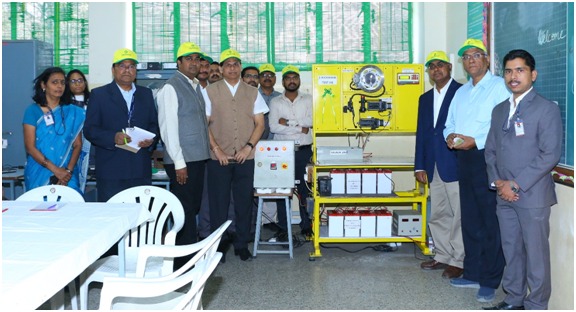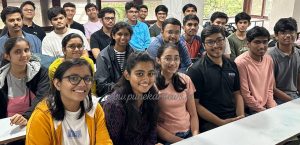‘Electric Vehicle Laboratory ‘inaugurated at Bharati Vidyapeeth College of Engineering (BV(DU)COE)

Pune:
Electric Vehicle Laboratory, in Department of Electrical Engineering, at Bharati Vidyapeeth (Deemed to be University) College of Engineering (BV(DU)COE), inaugurated at hands of Dr. Sagar Vekateshwaran,( Founder and CEO of OptiXtal Pvt. Ltd. )and in presence of Mr. Rama Sundaram, (Founder and CEO of Propellex solutions),and Dr. Anand Bhalerao, (Principal and Dean, Bharati Vidyapeeth (Deemed to be University) College of Engineering, Pune
Function held on 8th january 2019,at Bharati Vidyapeeth campus(Katraj )
Speaking on this occasion Dr. Sagar Vekateshwaran,( Founder and CEO of OptiXtal Pvt. Ltd. said that there will be a drastic demand of electric vehicles in India in near future and all should be ready to face the challenges towards electric vehicle. He informed that there is a huge market for formation of capacitors as product in different shapes. He concluded with summarizing the ongoing research on super capacitor and its form factor and the role of super capacitor in e-vehicles.
Mr. Rama Sundaram, Founder and CEO of Propellex solutions, said that there is no significant volume of electric vehicles in India. He explained, it can be seen from the fact that Indian industry has sold less than 5000 electric vehicles in last year. He put forth a summary of results of analysis of survey of e-vehicles in Northern part of India. He also summarized the actual results of research conducted in the Electrical Vehicle laboratory, in Department of Electrical Engineering, at BV(DU)COE.
Dr. D. S. Bankar, Head, Department of Electrical Engineering, at BV(DU)COE elaborated the research carried out in the Electrical Vehicle laboratory. He stated that these results claim a twofold extension of the battery life.
Faculty members and research students of Department of Electrical Engineering, BV(DU)COE, were also present for the inauguration ceremony of the Electrical Vehicle laboratory.
Dr Anand Bhalerao Expressing his views on electric vehicles in India, he said that plain answer to the aforementioned question is “NO”. Justifying his answer he said, the quality of infrastructure for electric vehicle connectivity for vehicle in India is still in progressive mode. In terms of electric vehicle connectivity, Norway is well ahead of all countries having 22% connectivity followed by 2% of China, whereas for India its only 0.02% at present, which makes electric vehicles in India by 2030 an ambitious plan, he stated. He expresses that expecting at least 20% to 30% of electric vehicles would be a realistic target for 2030.
He also informed about the launch of Government of India’s electric mobility mission plan 2020, under which Government proposes final projects, charging infrastructure projects and technological department projects with investments of 24 Million dollars. He further pointed that electric vehicles for mass transport and public transport such a OLA, UBER and Government establishment will be the biggest bank whereas personal use of electric vehicles will increase with the affordability.
In India corporate sectors such as Mahindra group, Hyundai motors, Tata motors, Suzuki, Toyota intend to come with electricvehicle by 2020 and are investing huge amounts for the same he stated.
He added, Lithium ion batteries are the main component of electric vehicles at present and are being imported by all these companies. ISRO has developed Lithium ion battery technologies and will make it open to all soon he further added. However the functioning of batteries, its efficiency and life are matters of research, and Bharati Vidyapeeth (Deemed to be University) College of Engineering, Pune, has come up with a dedicated research laboratory in collaboration with OptiXtal Pvt. Ltd., for the purpose he informed. Once batteries are made locally, it will also reduce price of vehicles he concluded.





